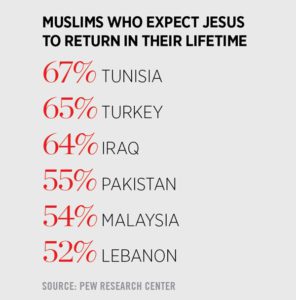The full version of this article first appeared December 30, 2016 at Christianity Today as “Who Awaits the Messiah Most? Muslims” by Jayson Casper.
Muslim belief in the end-times return of Jesus may seem surprising, but according to recent polls, they expect him with greater anticipation than do many American Christians.
The exact timing of events does not tend to be the concern of Muslim theologians. But the general narrative is that Jesus will descend to Earth, kill the pigs, break the crosses, perform the pilgrimage to Mecca, defeat the Christian armies of Rome, kill the Antichrist, and usher in a period of worldwide Islamic prosperity.
Recent events, and ISIS’ rapid expansion in 2014, sparked a flurry of Christian blogs linking biblical prophecies with Islamic
ones, and expressing fear that Muslims would take over the world. Pastor John MacArthur, for example, echoed the theme while preaching on the end times during the early days of the Arab Spring. “The Bible’s Antichrist is Islam’s Savior,” he said, speaking of the Mehdi, who initiates the events leading to the final judgment.

“I don’t think we should worry a whole lot about Islamic eschatology,” said Warren Larson, professor emeritus of Muslim studies at Columbia International University. “But it is important for all Christians to know something for the purpose of witness.”
But Imad Shehadeh, president of Jordan Evangelical Theological Seminary in Amman, finds little room for bridge building. “They are two parallel lines that never meet,” he said.
Doug Leonard, director of global mission for the Reformed Church of America, advises balance. “When two belief systems overlap, it can be harder to dialogue than when the worldviews are completely different,” he said. “But we have to enter the nuance of distinction,” said Leonard, “to avoid the pitfall of mistakenly thinking we agree.”
Some research shows that Christian eschatology can get in the way. Overly pro-Israel interpretations are a barrier to evangelism, conversion, and discipleship, according to one academic study of 150 Muslim converts in the Holy Land.
Yet regardless of how Christians interpret Revelation or read the times, Larson calls them back to the gospel’s hope. “We need to witness with assurance that faith in Jesus as the crucified, risen, and coming Messiah makes all the difference in this world,” he said. “And in the world to come.”

My understanding is that the Jesus of the Christians is different than the Jesus of Islam.
There are way more similarlites than differences… the main difference being Muslims do not believe in his death, resurrection and deity. Learn more in this 3 part series on Nabeel Qureshi’s new book: https://acts211.org/sharia-gospel-no-god-one-book-discussion/